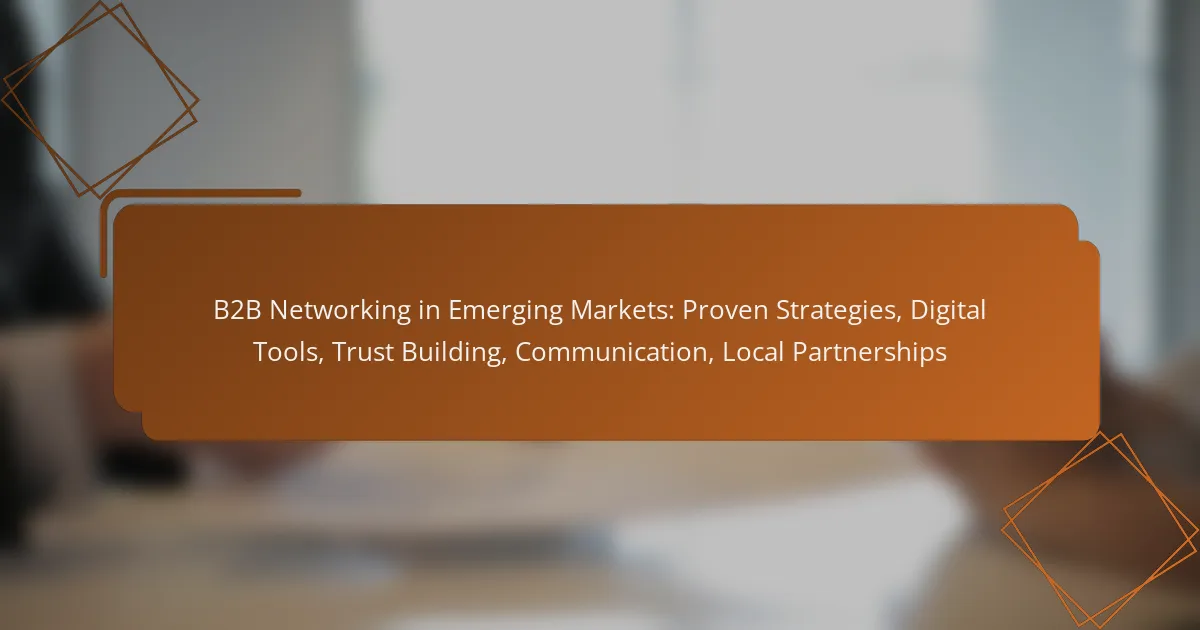B2B networking in emerging markets requires a strategic approach that emphasizes relationship-building and trust. By leveraging digital tools and engaging with local communities, businesses can forge valuable connections that promote growth and collaboration. Establishing consistent communication and transparency is essential for fostering long-term partnerships in these dynamic environments.

What Are Effective B2B Networking Strategies in Emerging Markets?
Effective B2B networking strategies in emerging markets focus on building relationships and trust while leveraging local resources. By engaging with local communities and utilizing digital tools, businesses can create valuable connections that drive growth.
Leveraging Local Events
Participating in local events is a powerful way to network in emerging markets. These gatherings often attract key industry players and potential partners, providing opportunities for face-to-face interactions that foster trust.
Consider attending conferences, workshops, or community gatherings relevant to your industry. Engaging in discussions and sharing insights can position your business as a thought leader and help establish long-term relationships.
Utilizing Social Media Platforms
Social media platforms are essential for B2B networking in emerging markets. They allow businesses to connect with a wider audience and engage with potential partners in real-time.
Focus on platforms popular in your target market, such as LinkedIn for professional networking or Facebook for community engagement. Regularly share valuable content and participate in discussions to enhance your visibility and credibility.
Building Industry-Specific Alliances
Creating alliances with other businesses in your industry can amplify your networking efforts. These partnerships can lead to shared resources, joint ventures, and increased market reach.
Identify complementary businesses and explore collaboration opportunities. For example, a technology firm might partner with a local distributor to enhance product availability and customer service in the region.
Engaging in Community Initiatives
Engaging in community initiatives helps build goodwill and trust within local markets. Participating in or sponsoring local projects demonstrates your commitment to the community and can lead to valuable connections.
Consider supporting educational programs, environmental efforts, or local charities. Such involvement not only enhances your brand image but also opens doors to networking opportunities with other businesses and community leaders.
Participating in Trade Shows
Trade shows are vital for B2B networking, offering a platform to showcase products and services while connecting with potential clients and partners. They provide a concentrated environment for business interactions.
When attending trade shows, prepare by researching exhibitors and attendees in advance. Set specific goals for the event, such as collecting a certain number of leads or arranging meetings with key contacts to maximize your networking efforts.

How to Build Trust in B2B Relationships?
Building trust in B2B relationships involves consistent communication, transparency, reliability, and sharing success stories. These elements create a foundation that fosters long-term partnerships, especially in emerging markets where trust can be a critical factor in business success.
Consistent Communication
Consistent communication is essential for establishing trust in B2B relationships. Regular updates, whether through emails, calls, or meetings, keep all parties informed and engaged. Aim for a communication frequency that matches the project’s complexity, typically weekly or bi-weekly check-ins work well.
Utilize digital tools like project management software or messaging apps to streamline communication. This ensures that all stakeholders have access to the same information, reducing misunderstandings and reinforcing trust.
Transparency in Transactions
Transparency in transactions builds confidence among partners. Clearly outline terms, pricing, and expectations from the outset to avoid surprises later. Providing detailed invoices and open access to relevant documents can enhance this transparency.
In emerging markets, where regulations may vary, being upfront about compliance with local laws and practices is crucial. This not only fosters trust but also positions your business as a reliable partner in the eyes of local stakeholders.
Demonstrating Reliability
Demonstrating reliability is key to maintaining trust in B2B relationships. Delivering on promises, meeting deadlines, and maintaining quality standards are all critical components. Consider implementing service level agreements (SLAs) to formalize expectations and accountability.
Regularly assess your performance against these commitments and communicate any challenges proactively. This approach shows partners that you value their trust and are committed to continuous improvement.
Sharing Success Stories
Sharing success stories can significantly enhance trust in B2B relationships. Highlighting past achievements with clients or partners demonstrates your capability and reliability. Use case studies or testimonials to illustrate how your solutions have positively impacted others.
In emerging markets, local success stories can resonate more deeply. Tailor your narratives to reflect cultural nuances and specific challenges faced by local businesses, reinforcing your understanding and commitment to the market.

What Digital Tools Enhance B2B Networking?
Digital tools play a crucial role in enhancing B2B networking by facilitating connections, managing relationships, and promoting collaboration. Leveraging the right platforms can significantly improve outreach and engagement in emerging markets.
LinkedIn for Professional Connections
LinkedIn is a powerful platform for building professional connections in the B2B space. It allows users to create detailed profiles, showcase their expertise, and connect with industry peers, making it easier to find potential partners and clients.
To maximize LinkedIn’s effectiveness, regularly update your profile, engage with relevant content, and join industry-specific groups. This can enhance visibility and foster trust among connections.
CRM Systems for Relationship Management
Customer Relationship Management (CRM) systems are essential for managing interactions with clients and prospects. They help businesses track communications, manage sales pipelines, and analyze customer data to improve relationships.
When choosing a CRM, consider factors like ease of use, integration capabilities, and scalability. Popular options include Salesforce and HubSpot, which offer features tailored to various business sizes and needs.
Collaboration Tools like Slack
Collaboration tools such as Slack facilitate real-time communication and project management among teams. These platforms enable businesses to streamline discussions, share files, and integrate with other applications, enhancing productivity.
To effectively use Slack, create dedicated channels for specific projects or topics, and encourage team members to participate actively. This can lead to quicker decision-making and stronger teamwork.
Networking Platforms like Meetup
Networking platforms like Meetup provide opportunities for businesses to connect with like-minded professionals through events and gatherings. These platforms can help foster relationships and expand networks in local markets.
When using Meetup, consider hosting or attending events that align with your industry. This can create valuable face-to-face interactions that strengthen connections and build trust within your community.

What Role Do Local Partnerships Play?
Local partnerships are crucial in emerging markets as they provide businesses with essential insights and connections that facilitate market entry and growth. By collaborating with local entities, companies can navigate cultural nuances and regulatory landscapes more effectively.
Access to Local Market Knowledge
Local partnerships grant access to invaluable market knowledge, including consumer behavior, preferences, and trends. This insight helps businesses tailor their offerings to meet local demands, increasing the chances of success.
For instance, a foreign company entering the Southeast Asian market can benefit from a local partner’s understanding of regional tastes and purchasing habits, which can differ significantly from Western markets.
Shared Resources and Expertise
Collaborating with local partners allows businesses to share resources, reducing operational costs and risks. This can include sharing technology, distribution networks, or even human resources, which can lead to more efficient operations.
For example, a startup might partner with an established local firm to leverage its existing supply chain, thus accelerating market entry and minimizing initial investment requirements.
Enhanced Credibility with Local Stakeholders
Forming partnerships with local entities enhances a company’s credibility among stakeholders, including customers, suppliers, and government bodies. Local partners can vouch for a business’s reliability and commitment to the market, which is essential for building trust.
In many emerging markets, having a local partner can be a prerequisite for securing contracts or permits, as it demonstrates a commitment to the community and adherence to local norms and regulations.

How to Communicate Effectively Across Cultures?
Effective communication across cultures requires understanding and adapting to diverse cultural contexts. This involves recognizing differences in language, values, and communication styles to foster collaboration and build trust.
Understanding Cultural Nuances
Cultural nuances encompass the subtleties in behavior, language, and social norms that vary from one culture to another. For instance, while direct communication is valued in some Western cultures, indirect approaches may be preferred in many Asian cultures. Recognizing these differences can prevent misunderstandings and enhance relationships.
To navigate cultural nuances, consider conducting research on the specific cultures you are engaging with. This could involve studying local customs, etiquette, and even common phrases. Engaging with local experts or cultural consultants can also provide valuable insights.
Adapting Messaging for Local Audiences
Adapting your messaging for local audiences is crucial for effective communication. This means not only translating language but also tailoring the content to resonate with local values and preferences. For example, marketing messages that work in the U.S. may need significant adjustments to appeal to audiences in Eastern Europe.
Utilize local idioms, references, and examples that are familiar to the target audience. Testing your messaging through focus groups or surveys can help gauge its effectiveness. Avoid jargon and overly complex language to ensure clarity and understanding.
